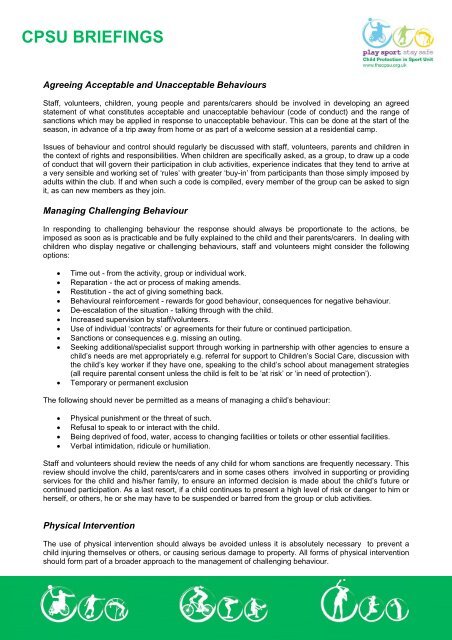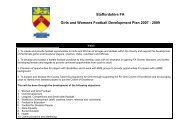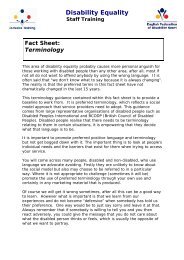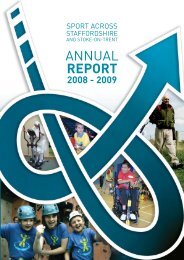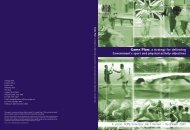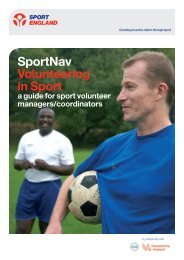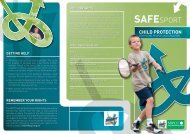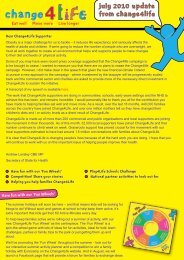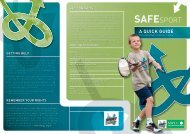Managing challenging behaviour guidelines (Child ... - GreaterSport
Managing challenging behaviour guidelines (Child ... - GreaterSport
Managing challenging behaviour guidelines (Child ... - GreaterSport
Create successful ePaper yourself
Turn your PDF publications into a flip-book with our unique Google optimized e-Paper software.
CPSU BRIEFINGS<br />
Agreeing Acceptable and Unacceptable Behaviours<br />
Staff, volunteers, children, young people and parents/carers should be involved in developing an agreed<br />
statement of what constitutes acceptable and unacceptable <strong>behaviour</strong> (code of conduct) and the range of<br />
sanctions which may be applied in response to unacceptable <strong>behaviour</strong>. This can be done at the start of the<br />
season, in advance of a trip away from home or as part of a welcome session at a residential camp.<br />
Issues of <strong>behaviour</strong> and control should regularly be discussed with staff, volunteers, parents and children in<br />
the context of rights and responsibilities. When children are specifically asked, as a group, to draw up a code<br />
of conduct that will govern their participation in club activities, experience indicates that they tend to arrive at<br />
a very sensible and working set of ‘rules’ with greater ‘buy-in’ from participants than those simply imposed by<br />
adults within the club. If and when such a code is compiled, every member of the group can be asked to sign<br />
it, as can new members as they join.<br />
<strong>Managing</strong> Challenging Behaviour<br />
In responding to <strong>challenging</strong> <strong>behaviour</strong> the response should always be proportionate to the actions, be<br />
imposed as soon as is practicable and be fully explained to the child and their parents/carers. In dealing with<br />
children who display negative or <strong>challenging</strong> <strong>behaviour</strong>s, staff and volunteers might consider the following<br />
options:<br />
• Time out - from the activity, group or individual work.<br />
• Reparation - the act or process of making amends.<br />
• Restitution - the act of giving something back.<br />
• Behavioural reinforcement - rewards for good <strong>behaviour</strong>, consequences for negative <strong>behaviour</strong>.<br />
• De-escalation of the situation - talking through with the child.<br />
• Increased supervision by staff/volunteers.<br />
• Use of individual ‘contracts’ or agreements for their future or continued participation.<br />
• Sanctions or consequences e.g. missing an outing.<br />
• Seeking additional/specialist support through working in partnership with other agencies to ensure a<br />
child’s needs are met appropriately e.g. referral for support to <strong>Child</strong>ren’s Social Care, discussion with<br />
the child’s key worker if they have one, speaking to the child’s school about management strategies<br />
(all require parental consent unless the child is felt to be ‘at risk’ or ‘in need of protection’).<br />
• Temporary or permanent exclusion<br />
The following should never be permitted as a means of managing a child’s <strong>behaviour</strong>:<br />
• Physical punishment or the threat of such.<br />
• Refusal to speak to or interact with the child.<br />
• Being deprived of food, water, access to changing facilities or toilets or other essential facilities.<br />
• Verbal intimidation, ridicule or humiliation.<br />
Staff and volunteers should review the needs of any child for whom sanctions are frequently necessary. This<br />
review should involve the child, parents/carers and in some cases others involved in supporting or providing<br />
services for the child and his/her family, to ensure an informed decision is made about the child’s future or<br />
continued participation. As a last resort, if a child continues to present a high level of risk or danger to him or<br />
herself, or others, he or she may have to be suspended or barred from the group or club activities.<br />
Physical Intervention<br />
The use of physical intervention should always be avoided unless it is absolutely necessary to prevent a<br />
child injuring themselves or others, or causing serious damage to property. All forms of physical intervention<br />
should form part of a broader approach to the management of <strong>challenging</strong> <strong>behaviour</strong>.


